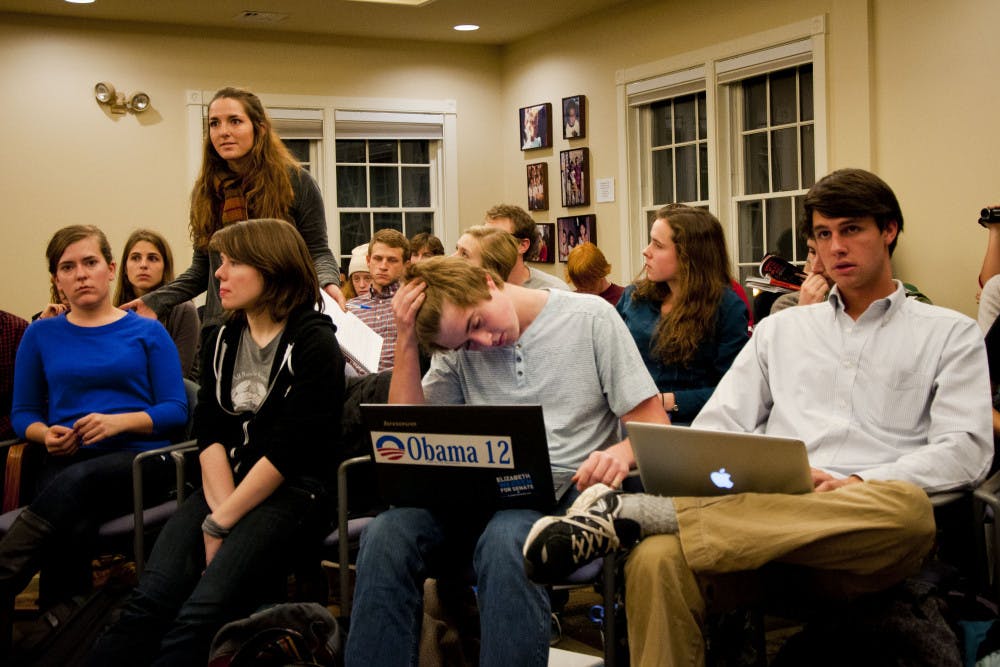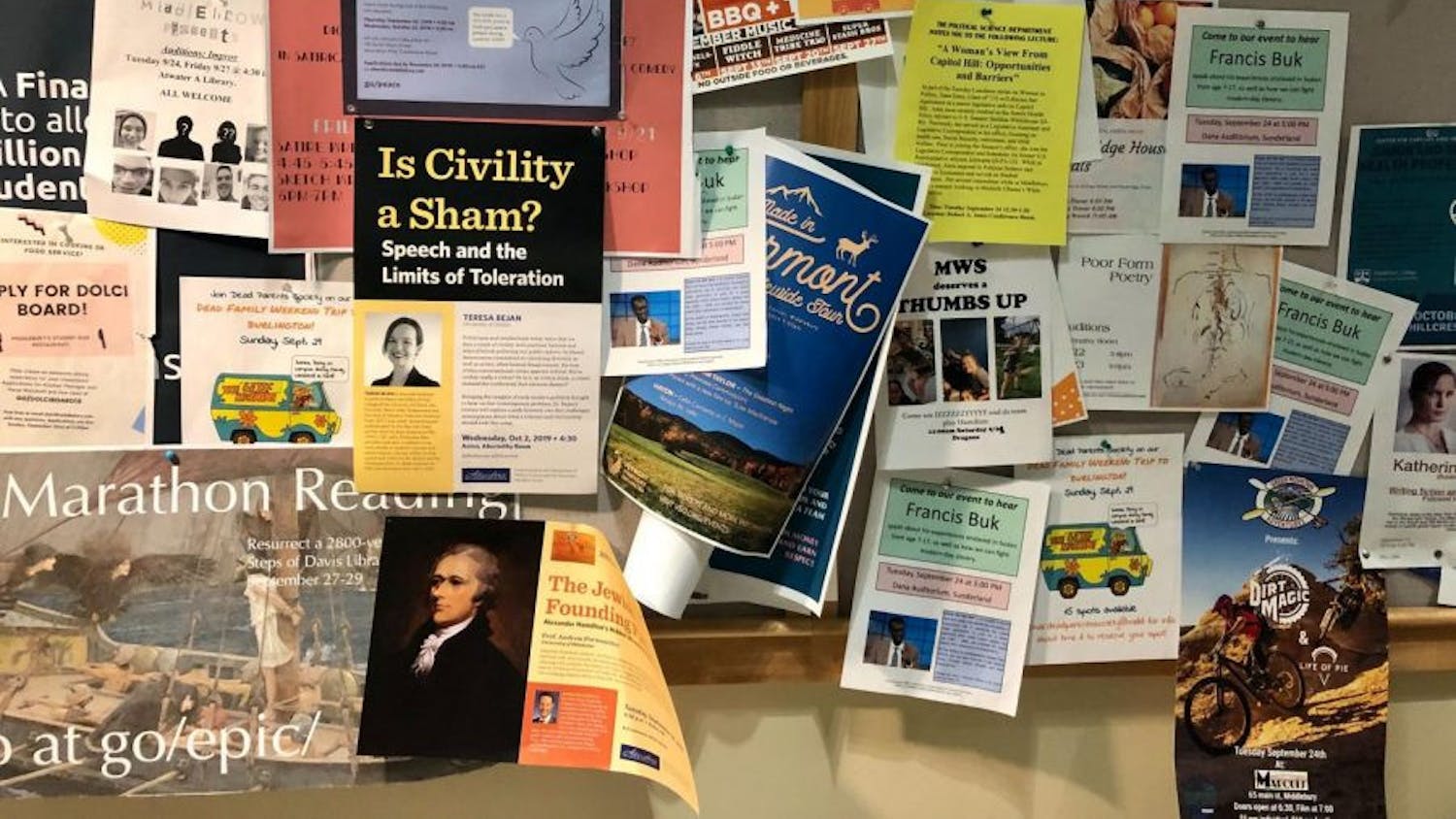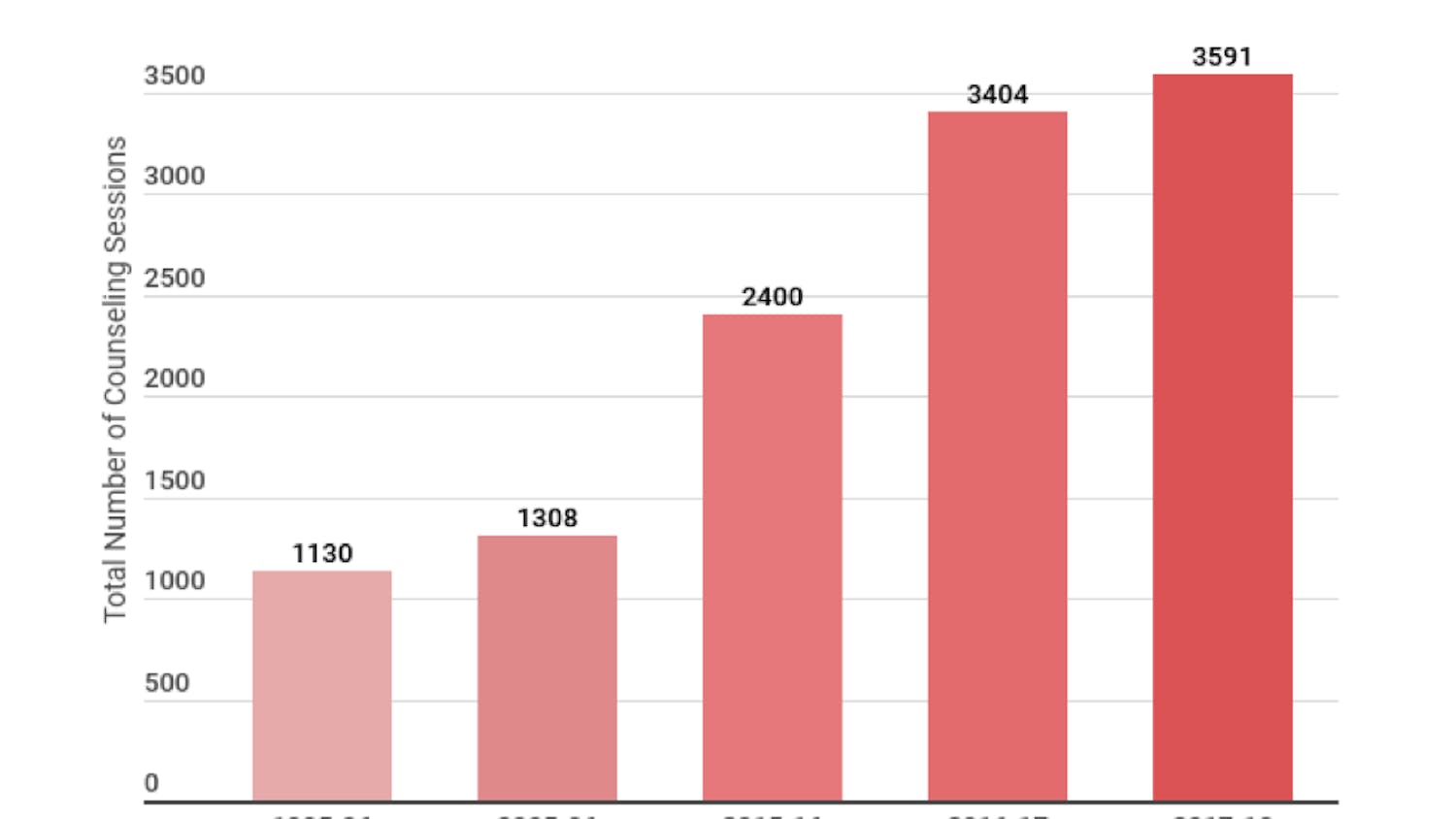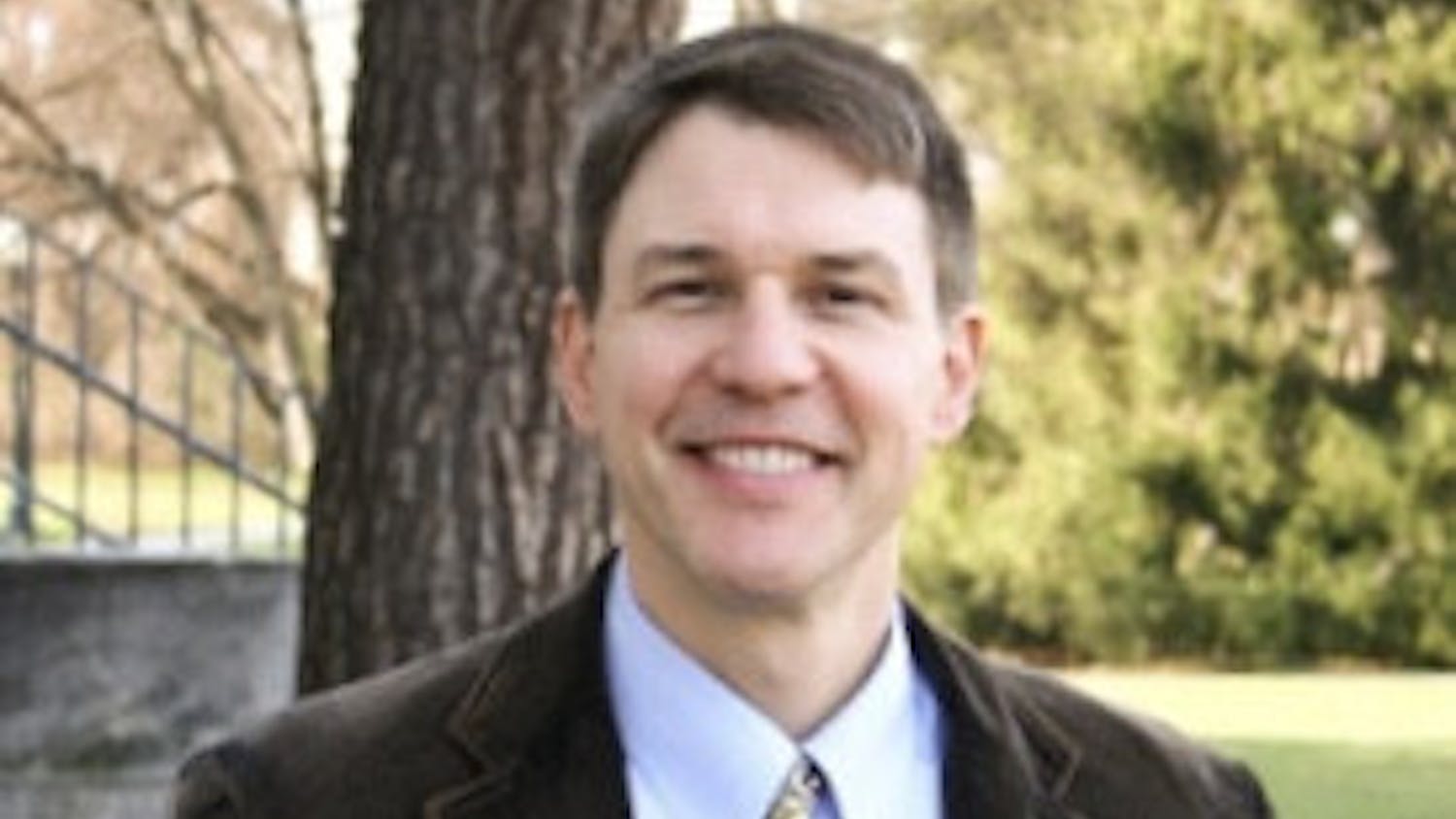
On Thursday, Nov. 15 Olav Ljosne, a senior manager at Shell, delivered a lecture entitled, "Meeting Future Energy Needs: Conflict and Cooperation", at the Robert A. Jones '59 Conference Room. Mr. Ljosne now works in communications, but previously served as the Regional External Relations Director for Africa, as well as a diplomat at the Norwegian embassies in Iraq, Saudi Arabia and Iran.
-----
Sunday: Following a weekend of comments on Gohl's and Noble's Middblog article, Ben-Abba writes an opinion piece, entitled "Between Gaza, Nigeria, and Middlebury".
Students and administrators have said repeatedly that they agree with the message but disagree with the means. To me this is a commitment to keep things as they are, in status quo, in “peace,” meaning that there is no disorder, disruption, doubt, discomfort, no justice. “War is peace,” as Orwell said, right? So let’s break the ends and the means and see what’s going on here. With our means we disrespected the $458 billion corporation’s right to express its opinion (of course, here Shell had more than enough time and space to express their stance, unlike at the University of Vermont, where the whole talk was disrupted). Our message is for divestment from unjust corporations and apartheid regimes in order to contribute to a world in which Arabs and Jews live in peace and equality and multinational giants like Shell Oil and Exxon Mobil don’t exist and resources are shared equally by all people regardless of their color and gun power. Divesting from Shell is disrespectful to Shell which in itself is disrespectful to humankind and the planet. The ends are as disrespectful as the means. Both means and message are about respect for basic human dignity and the environment and all living things. Therefore, if you don’t believe in our means, you don’t believe in our message. Separating the means from the message is intentionally misleading and disrespectful to victims of corporate crimes.
Friday: A "go/shellsofbullets" link is created and connects users to the Dalai Lama Welcoming Committee's blog. Their latest post discusses the group's actions at yesterday's lecture, in addition to offering quotes and a copy of the honorary doctorate presented to Mr. Ljosne. The post ends with a link to yet another divestment group (focused on Middlebury alumni), called Not a Dollar More.
Middblog also publishes a post on the lecture, as well as an opinion piece, entitled "Enough is Enough: Reflections on Campus Activism". The post is co-written by contributors Cody Gohl and Olivia Noble, and generates a great deal of discussion among alumni and students alike within the comments section.
Before arriving at the final draft of this piece, we thought about writing about activism in general and what it means to be a “good” activist, but we realized that we’ve got more to say than just that. We’re done beating around the bush – the Shell Protest yesterday by the DLWC pushed us overboard. It was a destructive demonstration of students hijacking what could have been a constructive conversation and turning it into something isolating and embarrassing. Our major issue is not the message they were sending, but the means by which they chose to do it: they used a platform that was not theirs from which to preach and showed zero respect for an opinion that differed from their own.
This semester, the word “activism” has been thrown around a lot, either by the self-proclaimed activists of the DLWC who cite Martin Luther King, Jr. and Ghandi as inspirations for their actions, or by students who believe the DLWC’s activism to be misguided. It has become a buzzword on campus, a powerful tool whose simple utterance seems to justify any action or statement that is made as long as it was said or done under the guise of being “activism.”
Through the actions of these students, the idea of activism has been warped into something contrary to its spirit. True activism should (and must) come from a place of love: of love for a people or a nation or a place or a community. It comes from a deep and intense desire to not only change the mindset of a group of people, but to change with them, to grab hands and dive into something new together. It comes from the recognition that there is an inequality and that we do not need to accept the world and circumstances in which we are born. Our rights to free speech, to practicing whatever religion we choose, even our right to vote are all things that were won out of the activist spirit of a group of individuals working together. Activism is a beautiful thing and it should not be taken lightly.
Gohl and Noble continue:
The community by and large stands behind the message the DLWC promotes. We believe in divestment and in responsible investing, but actions like yesterday’s alienate an incredible swath of people on this campus. Despite the assertion that actions like this raise the profile of issues and bring more people into the movement, it is our belief they do far more damage than they do good.
There is a place for dialogue and action, a place for pushing one another to challenge the status quo and there is a place for constructive criticism. However, there is no place for the kinds of disrespectful activism that has been demonstrated by the DLWC this semester. They do not listen, they do not attempt to push or challenge or grow with the community; instead, they demand attention and villainize anyone who stands in their way.
A continuous stream of comments have both supported and challenged the critique. An initial "standing ovation" is followed by a defense of the "harmless" protests. Others call the group and their actions "isolating" and "disrespectful", particularly in comparison to the students who expected true discussion.
Midd Alum writes, "[t]hese actions truly make me embarrassed for my alma mater based on what I view as the sheer lack of respect that this group has exhibited, which I feel reflects poorly upon our entire Middlebury community," while Midd Alumna 2004.5 adds, "what sacrifices have these entitled children made and stated publicly to back up their foolish behavior. Do they buy gasoline? Use a computer with parts made of petroleum and petroleum products? Have they given up their cars and longer fly home or to 'the islands' for break?"
Following this criticism are two comments in support of the Dalai Lama Welcoming Committee and their actions, including one by Ben-Abba. The former challenges the idea that the group does not engage in discussion, citing their biweekly forums, while Ben-Abba writes, "The regurgitated phrase 'we agree with the message but disagree with the means' is an authoritative catch phrase used to de-legitimize any action. Disagreeing with our means is disagreeing with our message. I am sorry you feel uncomfortable with the opinions we presented. Were you comfortable with the content of Ljosne’s lecture?"
Finally, hand-written opinions are also appearing on the now fading advertisement for the lecture in front of Proctor Dining Hall (pictured below beneath Wednesday's update). Messages debate the meaning of respect, as well as who that respect (or disrespect) is directed toward. "... What Will You Ask?" now reads "... What Will You Ask a
5:52: Signing off from the RAJ Conference Room. Feel free to continue the discussion by commenting below.
5:50: Following this question, Saper stands and again thanks the lecturer with a speech similar to those of Ben-Abba and Koplinka-Loehr. During his minute-long conclusion, about half the crowd rises to leave. Professor of Geography and Director of the Rohatyn Center Tamar Mayer stands to officially thank Mr. Ljosne. Ben-Abba and Koplinka-Loehr are still laying on the floor, as people step over them to leave.

5:46: For the final question, there is a calm back and forth about a Nigerian perspective of "our land, our nation". Mr. Ljosne acknowledges this perspective, and reiterated Shell's local work, as well as international discussion.
5:44: Another student asked if there is anymore Shell can do, realistically. Mr. Ljosne states that he always considers this question, and indicates the company's online spill list and their work in local communities. They haven't done everything perfectly, but they've also faced a great many security challenges.
5:41: The next question related to divestment: were it to be achieved across American campuses, would it even have an impact? Mr. Ljosne cannot answer this question without knowing the amount in which the institutions are invested. However, he believes the discussion to be beneficial for the future.
5:39: Questions continue, with a student reading the quote of a Nigerian about changing lifestyles and landscapes within his country; the quote is believed to have come from a book on the impact of Shell within Nigeria. Mr. Ljosne states that Shell simply can't answer to these broad accusations. However, they certainly take responsibility for their company and employees, as well as the communities in which they work. Additionally, Shell is looking toward the future.
5:36: Amitai Ben-Abba ’15.5 and Sam Koplinka-Loehr ’13 of the Dalai Lama Welcoming Committee stand to begin another protest. They each give brief speeches on how Mr. Ljosne has "white-washed" all of Shell's actions. "We asked you to teach us how to white-wash our own crimes," Ben-Abba states. After speaking, they each fall to the floor, as if they were shot. Others may have been prepared to speak; however, a student interrupts their protest, calling it disrespectful of the College and asking for the lecturer to continue. This is met with applause from about a third of the audience.

5:31: Mr. Ljosne continues, discussing theft and corruption within Nigeria. The theft happens in two ways: 1) somewhat professionally through pipelines (through which the company loses $5 to $8 billion dollars each year), and 2) through local resale (causing additional politician). Professor McKinney follows up this question with one of corporate responsibility, to which Mr. Ljosne responds that Shell is responsible for their spills or other environmental impact, but not the broader issues faced by Nigeria.
5:29: On a side note, there's been a great deal of movement by certain students walking into and out of the Conference Room. I'm unsure of what they're planning.
5:28: The next question comes from Visiting Assistant Professor of Geography Kacy McKinney; she asks about Mr. Ljosne's personal experience in the Niger Delta. Mr. Ljosne begins with the state figures, and tries to explain Nigeria's complexity with regard to geographic, ethnic and religious divisions. Many Nigerians have something of an identity crisis with stronger ties to the family and tribe than the region and country. This was the context of the Biafran War of the 1970's, and oil's presence only further complicated things. According to Mr. Ljosne, Shell entered into this bumpy Nigerian history, the roots of which have been very difficult to determine.
5:22: The next question relates to Shell's oil reserves: why continue pumping, when Shell leads its competitors in reserves? Mr. Ljosne answers, stating that Shell must replace all the reserves it uses for energy security. He continues to discuss Shell's focus on gas, which is cleaner than oil and coal, as the corporation waits for further technological development in order to more efficiently use renewables. Mr. Ljosne also reminds the audiance of Shell's small size, in comparison to larger national corporations, such as ARAMCO. He concludes, stating that the next breakthrough will likely be quite small (i.e. transitioning from oil to gas).

5:17: The next question relates to Arctic drilling, in which Shell is presently participating through experimentation. Mr. Ljosne labels the situation delicate, geopolitically speaking. Many countries have an interest and claim to the area, which is full of vast amounts of oil and minerals; however, this is no legal framework, as the region was historically unable to be explored and resources utilized. According to Mr. Ljosne, Shell is waiting on this framework, and their current exploration relates mainly to science: how would accidents or unexpected situations be handled? What are the environmental impacts?
5:12: The lecture transitions into a period of questions and answers, which are open to any subject: human rights, conflict, investment. The first question relates to Shell's ongoing trial in the Supreme Court; how can Shell be for human rights, yet defend itself in this trial? The question is meant with snaps by many audiance members, as a sign of approval. Mr. Ljosne explains that Shell to be a Dutch company, headquartered in the Netherlands and on the stock exchange in London. Nigerians have the opportunity to raise a human rights case against Shell in Nigeria, as well as internationally. However, how is the corporation connected to the United States? And wouldn't it set a dangerous precedent to place United States law above that of the International Criminal Court? Additionally, the Supreme Court trial has to do with the legality of Shell's prosecution within the United States, as opposed to any actual human rights violations.
5:04: A student with "OGANI" written in red on her forehead takes advantage of a brief pause in the lecture and asks about Shell's involvement in Nigeria. Mr. Ljosne states that the lecture will soon conclude, at which time all will have the opportunity for questions and answers. He returns to discussing the amount of water necessary to produce various food and beverages consumed on a regular basis. Therefore, all must cooperate in order to conserve both energy and water in the future.
5:03: Speaking of research, Shell is looking into how to most efficiently recycle water; the corporation currently recycles 90% of all water used in biofuel production within Latin America.
5:00: Another potential crisis is the declining availability of water for both food and energy production. According to Mr. Ljosne, Shell thinks about theses challenges, as it's in the world's common interest. 'Governments and businesses must work together to find solutions.' Returning to the students, Mr. Ljosne again their work to be essential.
4:57: Mr. Ljosne continues, stating that there will be nine billion people in the world by 2050; this translates to 300 newborns every minute or a new Dallas every week for the next thirty years. Most of this growth will occur in cities, where all water, food and energy requirements will need to be meant; the greenhouse gasses of these same cities must also be addressed. These are the challenges of the future.
4:55: Greater demand is dangerous for the world, and thus, there must be lifestyle changes, in addition to a reduction in carbon dioxide levels. According to Mr. Ljosne, this is where students and their research become crucial: 'you need to find new types of energy,' especially as the global population begins taking energy's availability for granted.
4:51: Mr. Ljosne transitions to discussion of the future, stating that oil demand will only increase with time. This is due to a growing global economy and global population, in which many will expect a higher standard of living. These new lifestyles will feature technical upgrades with washing machines, for example. Using a great deal of energy and water, such upgrades "will put the world under extreme pressure."
4:47: As Mr. Ljosne continues discussing corruption within these states, there appears to be a problem with microphone feedback within the Conference Room. I'm unsure whether it's a true technical issue or another form of protest.
4:45: Faced with these challenges, Shell has certain principles with regard to human rights and politics; the corporation abstained from voicing an opinion in the recent presidential election. Nevertheless, Shell faces additional transparency and security issues due to the governments with whom they work.
4:40: Mr. Ljosne speaks about society's dependence on extractive energies, explaining that he, like most others, doesn't like it. However, the world is indeed dependent, and most extraction occurs in places where people would rather it did not. While conflicts are blooming in these countries, others (i.e. North America, Europe and Japan) gain the most from the extractive practices.
4:37: Protests begin before Mr. Ljosne even starts speaking. Wearing graduation robes and playing Pomp and Circumstance March, Anna Shireman-Grabowski '15.5 and Jay Saper ’13 challenge Shell's human rights and environmental record, as well as offer Mr. Ljosne a "Doctor of Humane Letters" degree from the College "in recognition for his involvement in multiple human rights violations, consistent with the practices of the Middlebury College endowment, including: working closely with the Nigerian government to quell popular opposition to Shell’s presence, using deadly force against the Ogoni people, destroying the marine ecosystem of the Niger Delta that millions of people depend on, and greenwashing corporate war crimes." Mr. Ljosne refuses to accept.
4:32: The Conference Room at the Robert A. Jones '59 House has reached capacity, and doors have been closed. A crowd gathers at the conference room's entrance to listen to the lecture, as Mr. Ljosne is introduced by Dr. Gail Stevenson of the Vermont Council on World Affairs, the lecture's sponsor.

Wednesday: Divest for Our Future prepares students for Thursday's lecture with signs featuring statistics and quotes about the company posted throughout campus, as well as representatives discussing the issue and distributing handouts near Proctor Dining Hall.






